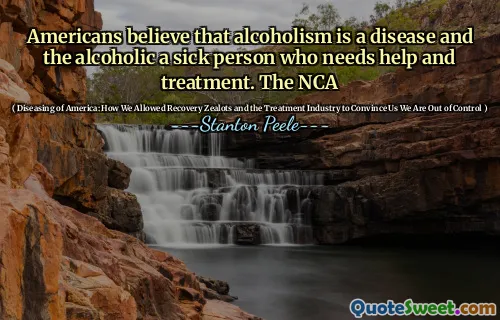Stanton Peele is a psychologist and author known for his unconventional views on addiction and recovery. He challenges traditional narratives that frame addiction as a chronic disease, asserting that it is largely influenced by social contexts, personal choices, and developmental factors. His work emphasizes the importance of understanding addiction within a broader framework rather than solely as a medical disorder. Peele advocates for a more personalized approach to treatment, suggesting that individuals can recover from addiction without relying on mainstream solutions such as 12-step programs. Instead, he emphasizes self-directed recovery and the significance of personal responsibility. His philosophy promotes the idea that individuals can regain control over their lives and redefine their relationships with substances. Additionally, Peele's writings critique the stigmatization of addicts and the societal misconceptions surrounding addiction. He strives to reshape public perception by highlighting the complexities of addiction and encouraging new methodologies for recovery that empower individuals rather than confine them to labels and stereotypes.
Stanton Peele is a prominent psychologist and author who has made significant contributions to the understanding of addiction. His work challenges conventional beliefs about addiction, proposing that it is influenced by a variety of social and personal factors rather than being merely a medical condition.
Peele advocates for a recovery model that empowers individuals to take charge of their own healing processes, instead of adhering strictly to traditional treatment methods. His approach promotes self-efficacy and emphasizes individual responsibility in overcoming addiction.
Through his writings, Stanton Peele seeks to dismantle societal stigmas surrounding addiction. By offering a more nuanced perspective, he hopes to foster better public understanding and acceptance of those struggling with addiction, encouraging effective recovery practices that resonate with individual experiences.
More »
Today Birthdays
1955 -
Max Lucado
1946 -
John Piper
1842 -
William James
1907 -
Abraham Joshua Heschel
1887 -
Aldo Leopold
1755 -
Alexander Hamilton
1976 -
Alethea Kontis
1971 -
Mary J. Blige
1825 -
Bayard Taylor
1943 -
Jim Hightower
1885 -
Alice Paul
1923 -
Carroll Shelby
1928 -
David L. Wolper
1954 -
Kailash Satyarthi
1972 -
Amanda Peet
1946 -
Naomi Judd
1970 -
Malcolm D. Lee
1955 -
Christian Marclay
1973 -
Rahul Dravid
1987 -
Jamie Vardy
1942 -
Clarence Clemons
1992 -
Fatima Sana Shaikh
1948 -
Larry Harvey
1930 -
Rod Taylor
